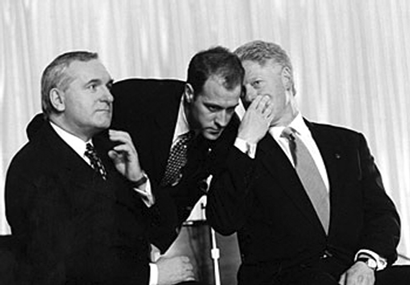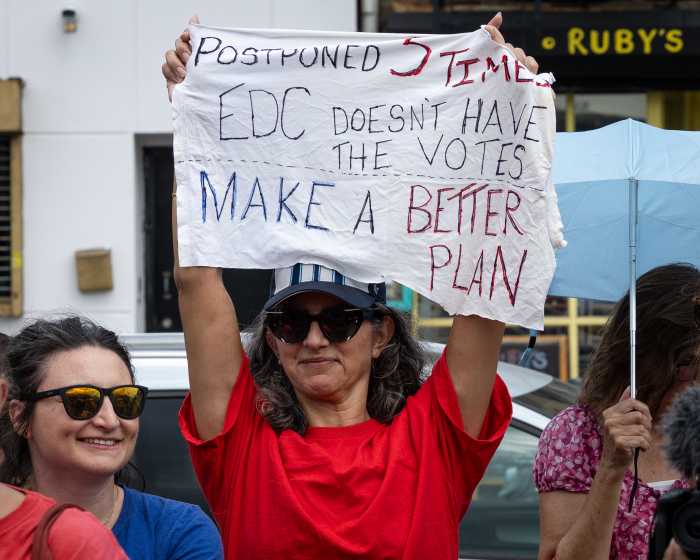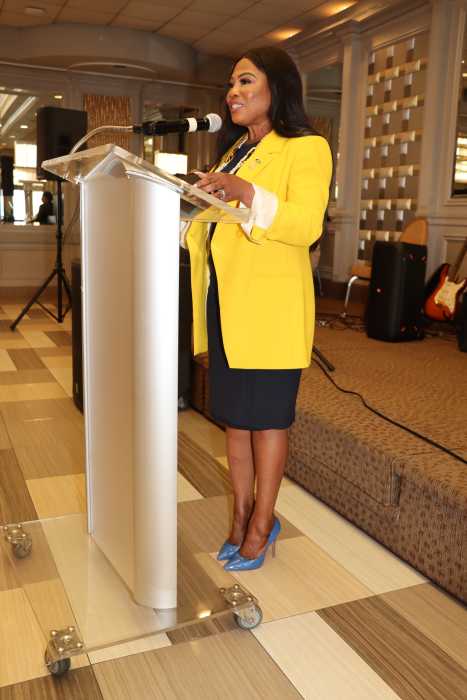Gay Ex-Bill Clinton aide tilts at Albany in AG bid
“The stuff that goes on in Albany every day would make Jack Abramoff blush,” said Sean Maloney, who talks a lot about corruption in New York’s capital city these day. He does so because that issue is central to his candidacy for the Democratic nomination for state attorney general. And in pushing the issue of “fixing” Albany, as he describes his mission, the gay Murray Hill attorney, who will turn 40 this spring, lays claim to the mantle as Eliot Spitzer’s logical heir.
The two-term incumbent attorney general, now the odds-on favorite for the Democratic gubernatorial nod, has earned a national reputation for fighting corporate corruption and Wall Street fraud. With a hard-charging Democratic Governor Spitzer, Maloney believes the attorney general’s office can apply the same laser focus to political corruption as it has to corporate crime during the past eight years.
“Eliot has had his hand tied behind his back because the Pataki administration has been stuffing the [public] authorities with their politically connected cronies for 12 years and doesn’t want anyone looking at that,” Maloney charged during an interview spanning several hours with Gay City News last Friday.
A dynamic Democratic duo in the governor’s mansion and the attorney general’s office will change all that, according to Maloney.
But first he has two hurdles to surmount—besting a Democratic field of at least five other candidates, including Andrew Cuomo, Bill Clinton’s housing secretary and son of the former governor, and Mark Green, the former New York City public advocate, and then defeating the Republican candidate, likely to be Jeanine Pirro, the former Westchester district attorney.
Maloney has his work cut out for him in matching the exceptional name recognition that any one of these three opponents enjoys, yet by any objective standard he comes to this race with impressive credentials of his own.
In the 14 years since he earned his law degree from the University of Virginia, Maloney worked for six years, in two stints, at Willkie Farr & Gallagher, the Manhattan law firm, focusing on criminal and institutional investigations of corporations; served as chief operating officer of a company that produces risk management software solutions for Wall Street firms, an enterprise he helped sell; and spent three years in the White House as Bill Clinton’s staff secretary, responsible for the flow of information to the president when executive decisions were required.
Maloney was first introduced to the Clintons when Susan Thomases, a Willkie Farr attorney he met as a summer associate there in 1991, invited him to dinner with Hillary, a longtime close friend of hers, at the end of that year. Five years after working on Clinton’s 1992 campaign, he was recruited to the White House by John Podesta, the staff secretary who went on to become the president’s chief of staff. Maloney’s work for the former president exposed him to politics in the biggest league possible. In response to skeptics who wonder whether he can slay several New York political giants, he responds that Washington has braced him for anything Albany can throw at him.
“People think I’m naïve and they think that I’m idealistic,” Maloney said to a crowd of roughly 100 supporters at an East Side fundraiser last week. “I don’t know why they think that about me, someone who spent three years in the Clinton White House. I worked directly with Bill Clinton for three years during the impeachment crisis and during the War in Kosovo. I understand politics. I understand how brutal it is and how ugly it can be.”
Say what he will, Maloney, raised in a large, Irish Catholic family in New Hampshire, does have a strong idealistic streak. He quotes the oft-repeated epigram, “When you’re Irish, sooner or later the world’s going to break your heart”—in order to insist that “my life is a struggle against that reality”—and he recites whole stanzas from the poem Robert Frost, also from New Hampshire, wrote for John F. Kennedy’s inauguration. Maloney told a room full of contributors, many of them gay men, “We don’t talk about poor people and we don’t talk about people who are shut out, and we don’t talk about people who are hated. And all of us in this room, many of us are not immune from these pressures.”
Yet the youthful passion that animates Maloney stands a good chance of engaging voters he is able to reach with his campaign. At the fundraiser and in the interview, he repeatedly made the point that Democratic voters are looking for fresh alternatives. A Marist College poll released on February 1 showed Cuomo in a commanding position at 40 percent of registered Democrats, Green in second place with 18 percent, but Maloney registering five percent, putting him ahead of the rest of the pack.
“I don’t think the top guys in this race have closed the deal with the people of New York,” he said at the fundraiser. “I don’t think they’ve got a reason to run this race.”
Over breakfast on Friday, Maloney was more blunt, clearly alluding to Cuomo’s abrupt withdrawal from the 2002 gubernatorial sweepstakes less than a month before the primary, and Green’s unsuccessful runs for mayor, in 2001, and U.S. senator, in 1986 and 1998.
“People say to me, ‘How are you going to win this race?’” he said. “And I say, ‘You know, I am one of the few people who hasn’t lost an election. What are you asking me for? Are you going to beat Jeanine Pirro with someone who has tried and failed in the past or is it better to have a fresh face with fresh ideas and a real passion for this work?’”
Maloney has pushed hard to back up his vigor with the dollars he believes he needs to run a winning race—a figure he pegs at $3 million. To date, he has collected roughly $1.3 million. Cuomo, with money left over from his 2002 race for governor, has about $4 million, and Green and Charlie King, the head of a non-profit housing organization and a two-time candidate for lieutenant governor, have each raised more than $2.2 million.
In raising funds, Maloney has identified a group of angels who are gay and/or significant contributors to LGBT causes. The list of donors who have given between $25,000 and $50,00 each includes: James Hormel, the first out gay U.S. ambassador, to Luxembourg in the Clinton administration; Jon L. Stryker, a Kalamazoo, Michigan, and Palm Beach, Florida philanthropist, whom Forbes magazine identifies as a billionaire and whose Arcus Foundation just made a $3 million contribution to the National Gay and Lesbian Task Force; Tim Gill, the creator of Quark, the desktop publishing software, who maintains an LGBT charitable foundation; Christopher H. Browne, a Manhattan financier and Empire State Pride Agenda supporter; and Jonathan D. Lewis, of Coral Gables, Florida, a major donor to Miami’s Project YES, an LGBT youth suicide-prevention and health empowerment effort. Maloney also counts David Mixner, Clinton’s closest gay confidante early in his administration who attended last week’s fundraiser, as a significant supporter.
Maloney has also been able to tap into money outside the usual gay circles. The fundraiser last week was in the East 60s townhouse of Richard and Dorinda Medley. In a richly varied career, Medley has served as chief economist for the U.S. House of Representatives, the same position for the Senate Democratic Leadership, head of the Yale Center for International Finance, and founder of a global advisory firm.
Maloney said that his success in attracting major contributors and amassing a war chest already over $1 million has given him credibility with major Democratic powerbrokers. In the past several weeks, he sat down with both former state Comptroller Carl McCall and former Mayor Ed Koch, who asked him, “How are you going to win as a gay guy?”
“I’m not running as the gay guy,” Maloney said he told the former mayor.
“You know, I talk until I am blue in the face about investigating the public authorities, and about investigating pay-to-play lobbying in Albany and about investigating Medicaid fraud, and about investigating partisan redistricting, and about all the corrupt, difficult, horrible, long-standing problems in our state government,” Maloney told the crowd at the Medley residence. “If you don’t tackle that stuff, you can’t accomplish goal number one. You can’t do it. You can’t use government as a progressive force in people lives unless you can say to people, ‘We’re going to take your money and you’re going to know what we do with it.’”
On his Web site, Maloney rails against the way Republican Senate Majority Leader Joe Bruno’s son Kenneth profits by lobbying his father’s staff. In the interview, he mentioned the cool $500,000 fee former GOP Senator Alfonse D’Amato earned for a single phone call he made regarding a misbegotten real estate deal attempted by the Metropolitan Transportation Authority. The MTA, in Maloney’s view, is the worst of what he said are more than 700 public authorities in the state, largely unaccountable to the people and even elected officials, that have accumulated $125 billion in debt, as much as $45 billion of that unrelated to their chartered public purposes.
But Maloney conceded that Democrats are complicit in this status quo. The State Dormitory Authority, he said, is a slush fund for Assembly Democrats, in the same way the Empire State Development Authority is for the Republicans. How would an Attorney General Maloney stand up to waste and corruption in which his own party participates?
“There are going to be people invested in that status quo for whom change is terrifying,” he conceded, before explaining, with language borrowed from Clinton’s first presidential campaign, “I think this election is about change. I think it is fundamentally about whether we embrace and see change as our friend and can communicate to Democrats and to other people why change is going to bring us to a place that is more prosperous and more interesting and more competitive and, ultimately for Democrats, more powerful. So you can have more power, so you can have much more than you have now for the people you care about and for the issues you care about and for yourselves. If you have the courage to change and to lead.”
One thing Maloney will not change is the way the attorney general’s office is positioned relative to the same-sex marriage lawsuits winding their way through the state court system. Spitzer is currently defending the state law—which his office interprets as precluding gay marriage—against constitutional challenges in five lawsuits by gay and lesbian plaintiffs. Asked how he would respond to the possibility he would be asked to step up and argue against same-sex marriage plaintiffs before the state’s highest court in 2007, Maloney decisively responded, “Do your job. You do your job or you shouldn’t run.”
Some gay advocates have urged Spitzer to tell the courts that he agrees that barring gay marriage is unconstitutional, but Maloney said there is no “principled basis” for acting in that manner. To do so, he said, would immediately lead to calls for the attorney general to disavow the state’s position on other issues—for example, its fight against the Campaign for Fiscal Equity which aims to deliver a fair share of tax dollars back to New York City.
“If I heard another candidate in this race say I am not going to defend the state in the Campaign for Fiscal Equity—that would be a very tempting thing to say—I’d take his head off,” Maloney said. “I’d say, ‘That is the most craven, demagogic thing to say. You have just invalidated yourself as a guy who has the integrity to really do this work.’”
Maloney is convinced the arguments defending the state’s posture on same-sex marriage can be made in a manner respectful of gay and lesbian aspirations and that there is even room within the scope of the attorney general’s duties to acknowledge the significant constitutional questions raised against the status quo. Unlike the attorney general, however, he believes that Mayor Michael Bloomberg was under no similar obligation to defend the state marriage law. Had the mayor not appealed last February’s favorable marriage ruling in Manhattan, which Maloney attributed to reelection considerations, the state would have interceded in any event, he argued.
As he addressed the gay marriage issue, Maloney emphasized that he is someone “who feels it personally, by the way.” Indeed he does. With his partner of more than 12 years, Randy Florke—a realtor, interior designer, and published author, who is expert not only on country properties in upstate Sullivan County, but also on how to transform them — Maloney has three children: Jesus, who is 16 and has lived with the couple since he was three, and Daley, 5, and Essie, 3, both adopted at birth.
In addition to his legal and political accomplishments and ambitions, Maloney may also be the quintessential modern Manhattan family man. Prior to a 9 a.m. interview, he had walked his daughter Daley to school, as he strives to do everyday. He had also been to the gym.
gaycitynews.com



































